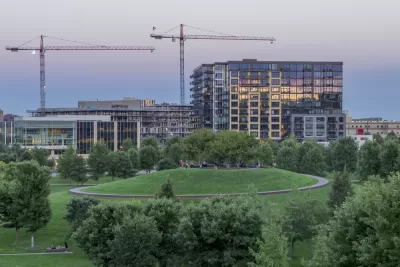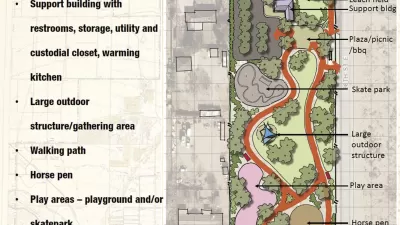Minneapolis wants more equity in its parks spending—and new plans are a key step in the process of delivering more equitable results.

"For the first time, the Minneapolis Parks and Recreation Board is writing comprehensive plans for every one of the city’s neighborhood parks, documents meant to guide development of the spaces for the next 20 to 30 years," reports Jessica Lee.
The comprehensive plans are necessitated by a change in parks budgeting established in 2016, when the city added an "Equity Matrix" to park funding decisions. The system was created "to reform a system that historically invested more money into the city’s more affluent, and whiter, neighborhoods," according to Lee.
"But with that new matrix in place, parks officials needed plans for how, exactly, to spend the money. That’s where the master plans for neighborhood parks come in," explains Lee.
The Minneapolis Parks and Recreation Board has been working on plans since 2016, along the way "[approving] long-range plans for neighborhood parks south of downtown and east of Interstate 35W [pdf], as well as those in the city’s urban core [pdf]. Then, in the spring of 2019, the board finalized the North Service Area Master Plan (which covers areas west of the Mississippi and north of Interstate 394) and the East of the River Park Master Plan (which pertains to northeast and southeast Minneapolis.)"
That's not even all the work that's underway at at various stages of the planning process, according to the article. Lee also updates the overall scope of the work and focuses on specific parks presenting more complex challenges as well.
FULL STORY: From pickleball to pollinators, people have a lot of thoughts about parks in southwest Minneapolis

Maui's Vacation Rental Debate Turns Ugly
Verbal attacks, misinformation campaigns and fistfights plague a high-stakes debate to convert thousands of vacation rentals into long-term housing.

Planetizen Federal Action Tracker
A weekly monitor of how Trump’s orders and actions are impacting planners and planning in America.

San Francisco Suspends Traffic Calming Amidst Record Deaths
Citing “a challenging fiscal landscape,” the city will cease the program on the heels of 42 traffic deaths, including 24 pedestrians.

Defunct Pittsburgh Power Plant to Become Residential Tower
A decommissioned steam heat plant will be redeveloped into almost 100 affordable housing units.

Trump Prompts Restructuring of Transportation Research Board in “Unprecedented Overreach”
The TRB has eliminated more than half of its committees including those focused on climate, equity, and cities.

Amtrak Rolls Out New Orleans to Alabama “Mardi Gras” Train
The new service will operate morning and evening departures between Mobile and New Orleans.
Urban Design for Planners 1: Software Tools
This six-course series explores essential urban design concepts using open source software and equips planners with the tools they need to participate fully in the urban design process.
Planning for Universal Design
Learn the tools for implementing Universal Design in planning regulations.
Heyer Gruel & Associates PA
JM Goldson LLC
Custer County Colorado
City of Camden Redevelopment Agency
City of Astoria
Transportation Research & Education Center (TREC) at Portland State University
Jefferson Parish Government
Camden Redevelopment Agency
City of Claremont





























